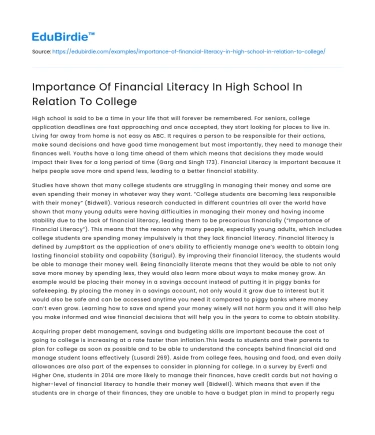High school is said to be a time in your life that will forever be remembered. For seniors, college application deadlines are fast approaching and once accepted, they start looking for places to live in. Living far away from home is not easy as ABC. It requires a person to be responsible for their actions, make sound decisions and have good time management but most importantly, they need to manage their finances well. Youths have a long time ahead of them which means that decisions they made would impact their lives for a long period of time (Garg and Singh 173). Financial Literacy is important because it helps people save more and spend less, leading to a better financial stability.
Studies have shown that many college students are struggling in managing their money and some are even spending their money in whatever way they want. ”College students are becoming less responsible with their money” (Bidwell). Various research conducted in different countries all over the world have shown that many young adults were having difficulties in managing their money and having income stability due to the lack of financial literacy, leading them to be precarious financially (“Importance of Financial Literacy”). This means that the reason why many people, especially young adults, which includes college students are spending money impulsively is that they lack financial literacy. Financial literacy is defined by Jump$tart as the application of one’s ability to efficiently manage one’s wealth to obtain long lasting financial stability and capability (Sarigul). By improving their financial literacy, the students would be able to manage their money well. Being financially literate means that they would be able to not only save more money by spending less, they would also learn more about ways to make money grow. An example would be placing their money in a savings account instead of putting it in piggy banks for safekeeping. By placing the money in a savings account, not only would it grow due to interest but it would also be safe and can be accessed anytime you need it compared to piggy banks where money can’t even grow. Learning how to save and spend your money wisely will not harm you and it will also help you make informed and wise financial decisions that will help you in the years to come to obtain stability.
Save your time!
We can take care of your essay
- Proper editing and formatting
- Free revision, title page, and bibliography
- Flexible prices and money-back guarantee
Acquiring proper debt management, savings and budgeting skills are important because the cost of going to college is increasing at a rate faster than inflation.This leads to students and their parents to plan for college as soon as possible and to be able to understand the concepts behind financial aid and manage student loans effectively (Lusardi 269). Aside from college fees, housing and food, and even daily allowances are also part of the expenses to consider in planning for college. In a survey by Everfi and Higher One, students in 2014 are more likely to manage their finances, have credit cards but not having a higher-level of financial literacy to handle their money well (Bidwell). Which means that even if the students are in charge of their finances, they are unable to have a budget plan in mind to properly regulate their finances.
The lack of financial literacy is quite alarming because this may lead the young adults to face higher level of financial problems which may significantly affect their present and future family and their professional life (Sarigul). Some of these problems would be managing their loans, budgeting and differentiating wants from needs, and even planning for the future like retirement. Being financially literate would help in solving these problems because they would distinguish between wants and needs, reducing the expenses brought by purchasing too much. This is especially so, because the authority to invest and save has transferred from the government and even the parents to individuals (Garg and Singh 173). Which means that a person is responsible for their own money. They have the authority to spend in whatever way they want, using credit cards to shop repeatedly, and even taking out loans to buy cars and houses not within their financial capacity which therefore increases their debt. This will affect them badly in the long run.
Youngsters should be considered as an important target for financial education (Fraczek and Klimontowicz 76). This is because Agarwal et. al, “show that financial mistakes are most prevalent among the young and the elderly” (qtd. in Lusardi 269). Thus, measures to educate the youth should be taken, such as, having the initiative to have finance courses in schools in order to educate them early. U.S. has already implemented financial education programs over the years. An example would be the U.S. states mandating financial education in different points in time (Lusardi and Mitchell). However, only some states have done this, seventeen to be exact, mandating high school students to take finance courses in the 2018 survey (“Survey of the States”). This goes to show that there is still a lack of awareness about the importance of financial literacy, even among the federal government of other states. Financial literacy should be in high school or maybe even earlier in order to prepare them for the time when they will manage their finances on their own. Doing this will improve one’s financial well-being and lessen their spending and increasing their savings.






 Stuck on your essay?
Stuck on your essay?

